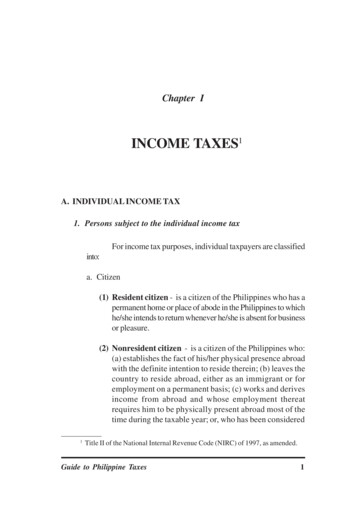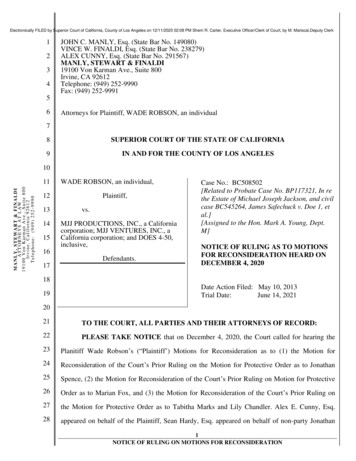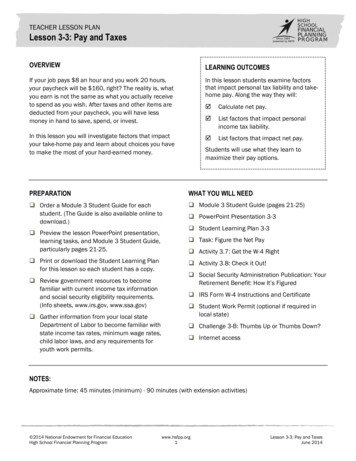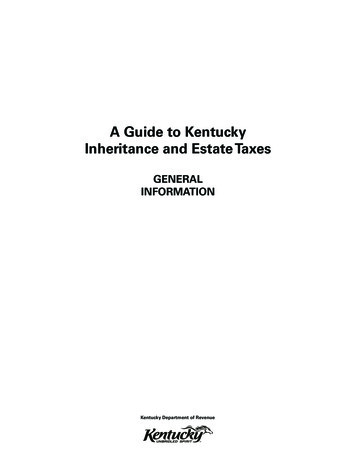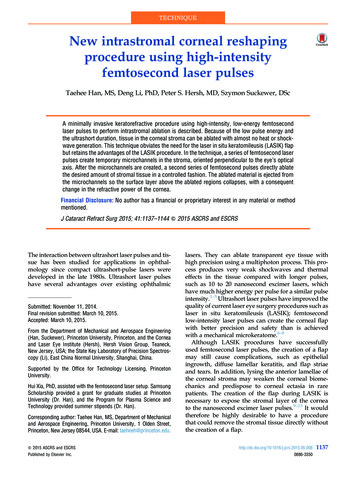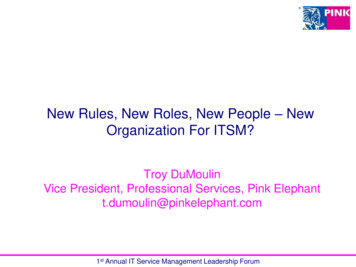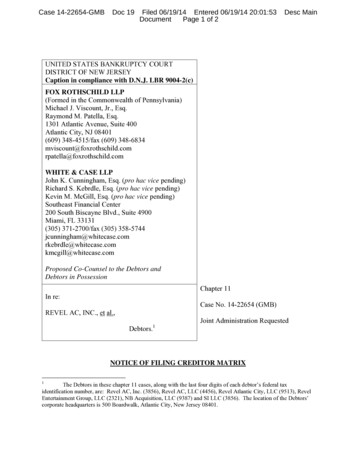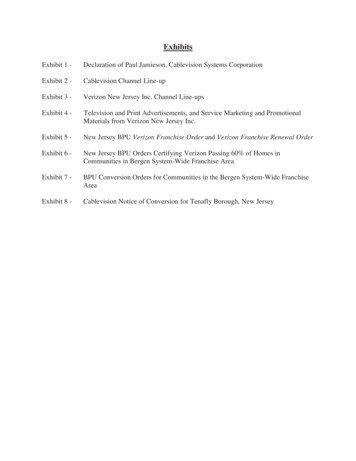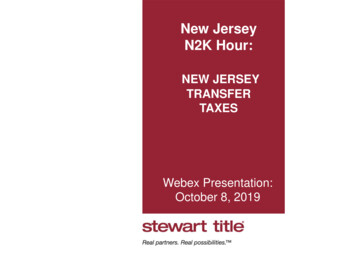
Transcription
New JerseyN2K Hour:NEW JERSEYTRANSFERTAXESWebex Presentation:October 8, 2019
Transactions Subject to RTF The Realty Transfer Tax or Realty Transfer Fee (RTF) mustbe paid in order to record a deed transferring title to realproperty in the state of NJ. It should be noted that if a deed is recorded, and it isdetermined later that additional RTF fees are due, thedeed is still valid and the buyers status as Bona FidePurchaser is not affected. The statute (N.J.S.A. 4c:15-5 et seq.) imposes the fee onthe seller, but the parties can agree otherwise. Regardlessof the parties agreement if, after the fact, it is determinedthat additional tax is due, the seller will be liable for it.
Transactions Subject to RTF - continued The RTF must be paid when the deed conveys a freeholdestate or a lease for a term of 99 years or more. Incalculating the lease term for purposes of imposition of thetax, contemplated renewal terms count. The tax is also imposed on the recording of proprietaryleases and assignments of such leases in connection withco-operative apartment units. These documents are notoften recorded these days. Conveyances of leases for less than 99 years, nonfreehold estates (including easements, rights of way, etc.)are not subject to the RTF.
Exemptions to the RTF The statute delineates full exemptions to the RTF and alsopartial exemptions which allow a reduction in the feeamount that would otherwise apply. Some of the full exemptions which will be encounteredmost frequently are (1) deeds for a consideration of lessthan 100 (2) confirming or correcting a previouslyrecorded deed (3) between husband and wife or parentand child (4) within 90 days following entry of a divorce (5)by an executor or administrator of an estate to an heir toeffect distribution. Please review N.J.S.A. 4C:15-10 for the full list ofexemptions. There are some considerations to take intoaccount in determining whether a deed qualifies for one ofthe full exemptions.
Exemptions to the RTF - continued The exemption fee for a deed for a consideration of lessthan 100 is often misunderstood, primarily because of afailure to understand the definition of “consideration”. Consideration is anything of value. Accordingly a transferfor a nominal consideration on a property with an existingmortgage encumbrance must pay an RTF on the value ofthe mortgage. Similarly a deed from one legal entity to another withcommon ownership cannot avoid the RTF with a nominalconsideration deed. The RTF in this case could becalculated on the value of the stock transferred or theassessed value may be utilized divided by the Director’sRatio of the municipality.
Exemptions to the RTF - continued Deeds between husband and wife and parent and child areexempt, however, one must be careful in the case of stepchildren. A deed into a step-child is not exempt unless the step-childhas been adopted. A step-parent step-child relationshipsatisfies the condition. A deed from a parent to a child andthe child’s spouse is exempt. However if the person otherthan the child is not the spouse, the transfer is only exemptas to ½ of the consideration. A transfer by a parent to a grantee in trust, even for thebenefit of the parent’s children as beneficiaries is notexempt. See N.J.S.A. 18:16-5.11(b).
Exemptions to the RTF - continued Occasionally there is confusion as to the exemption fordeeds recorded within 90 days of a final judgment ofdivorce. Note that the deed must be recorded during thatwindow. A full exemption category that I didn’t specifically mentionbefore is a deed given in specific performance of a finaljudgment. We sometimes get inquiries as to why thisexemption can’t be utilized when more than 90 days havepassed since a divorce decree was issued.
Exemptions to the RTF - continued The argument arises when a property settlementagreement contemplating a sale of the property by onespouse to the other is incorporated with the divorcejudgment. This argument fails, however, because it hasbeen held that the separation agreement is consensualand not part of the order. Carlson v. Carlson, 72 N.J. 363(1977).
Partial Exemptions to the RTF The partial exemptions to the RTF, which require apayment of a smaller amount that the full RTF would be,are for senior citizens, blind persons, disabled persons,and on property which is low and moderate incomehousing. In order to qualify for the senior citizen discount a personmust be a NJ resident, must be 62 years old or older andmust occupy the property. A vacation home may qualify asoccupied if the person lives there for at least 2 or 3 monthsa year and does not rent out the property. In the case of people who are married or in a civil uniononly one person is required to be 62 or older to qualify forthe partial exemption on the full consideration.
Partial Exemptions to the RTF - continued If the property is owned by 2 or more people 1 or severalof which do not qualify, a qualifying senior citizen may stillbe entitled to the partial exemption for his or her share ofthe proceeds. In order for this to be true, the property must be owned astenants in common (except in the case of husband andwife or civil union partner). If the parties own as jointtenants the qualifying senior cannot claim the partialexemption. In the event there are qualifying and non-qualifying cotenants, contact the Realty Transfer Fee Unit of theDivision of Taxation. They will provide a letter with abreakdown of fees that must be presented to the CountyRecording Officer when recording the deed.
Partial Exemptions to the RTF - continued The same joint tenancy restriction is applicable in the caseof a blind or disabled co-tenant. Disabled person, for the purposes of the partial exemption,is defined as a resident of NJ who is “permanently andtotally disabled, unable to engage in gainful employment,and receiving disability benefits or any other compensationunder any federal or state law”. The definitions of a blind person and low or moderateincome housing are somewhat complicated. The full list ofdefinitions can be found on the instructions page of theform.
The Mansion Tax The so called mansion tax is part of the RTF and imposesa 1% fee on the entire amount of consideration for certaintypes of property when the consideration recited in thedeed is in excess of 1 million dollars. The fee, as per the statute, is imposed upon the buyer.The parties to a transaction can of course negotiate theresponsibility for the payment. The types of property subject to the tax are 4A(commercial), 2 (residential), 3A farm property (regular) butonly if there is a building or structure on the farm propertyintended for residential use which is also transferred to thesame buyer with the farm. Cooperative units are alsosubject to the tax.
The Mansion Tax - continued The definitions of these types of properties can be found inN.J.S.A. 18:12-2.2. The definitions are mostly intuitive andyour tax search is going to show the type of property soyou should be able to determine when the mansion taxapplies. The distinction with farm property is that it is eitherqualified and assessed under The Farmland AssessmentAct (3B property NOT subject to mansion tax) or notqualified and assessed under the Act (3A property which issubject to the tax).
The Mansion Tax - continued The other classes of property which are not subject to thetax are defined in the administrative code sectionreferenced above. Industrial properties and apartmentsare examples. Contact your underwriter if there is anyquestion as to applicability.
The Mansion Tax - continued The mansion tax is based on the full and actualconsideration being paid for the property. Needless to sayvarious techniques have been employed to avoid the tax. An example of an idea that doesn’t work would be where ahusband and wife are going to buy a house for 1.2 millionand instead enter into separate contracts for 600,000each. The intention of the parties here is to purchase theproperty together and whether they receive separatedeeds or not the total consideration is 1.2 million. Theseparate contract and deed scheme is a fiction and themansion tax is due.
The Mansion Tax - continued The buyer must attach the Affidavit of Consideration ForUse By Buyer (RTF-1EE) when submitting a deed forrecording subject to the mansion tax. If the property isClass 2 (residential) or 3A Farm, Paragraph 2(c), thecalculation of equalized assessed value does not have tobe filled out. The equalized value calculation must be filled out for Class4A (commercial) properties. This is accomplished bydividing the assessed value by the Director’s Ratio for themunicipality where the property is located.
The Mansion Tax - continued The Director’s Ratio for each municipality can be found byutilizing The Table of Equalized Value available on theState of NJ (Treasury) website. The tax is calculated onthe deed consideration, not the equalized valuecalculation.
The Mansion Tax - continued The Affidavit of Consideration For Use by Seller must beattached to all deeds for the transfer of Class 4 property.This is so for Class 4B and Class 4C when no mansion taxis due, as well as for Class 4A. Section 3A must be filled out if the property is 4A andtherefore subject to the mansion tax. The amount of thetax is calculated on the amount of consideration, not theequalized value. It is interesting to note that the instructions for the BuyerAffidavit of Consideration requires use of the form for 4Aproperty when the equalized value is over a million or theconsideration is over a million. So if the purchase price is 990,000 but the equalized value is 1,000,001, the formmust be used.
Controlling Interest Transfer Tax The Controlling Interest Transfer Tax (CITT) applies insituations where there is a transfer in the controllinginterest of an entity which owns 4A property with a value ofover 1 million dollars. If the property is the only asset of the acquired entity, thepurchase price is used to determine the tax amount. If theentity owns other assets the equalized assessed value isutilized and a tax is due only if the value exceeds 1 milliondollars. There is an applicable form called the CITT-1 and the formmust be attached to the transferor/seller’s NJ business taxreturn. There are exemptions to the requirement to paythe tax. Please see the CITT-1E Statement of WaiverForm and check with your underwriter.
Non-resident Income Tax Withholding The Non-resident Seller’s Tax Declaration (GIT-REP 1)must be submitted with a deed for recording when theseller is a non-resident. In other words a person who livesoutside of the State of New Jersey and doesn’t qualify forany of the exemptions. A non-resident seller is subject to withholding for incometax purposes and the settlement agent must collect theamount received and submit the funds in order for thedeed to be recorded.
Non-resident Income Tax Withholding continued The amount of withholding is determined by multiplying thegain from the sale by the highest Gross Income Tax ratethen in effect. This rate is currently 10.75%. This issubject to the proviso that in no event can the amount ofwithholding be less than 2% of the non-resident seller’sshare of the consideration.
Non-resident Income Tax Withholding continued As a practical matter the amount collected at closing isvirtually always the 2% of total consideration amount. The withholding tax may be prepaid prior to the closing.This procedure requires the use of the Non-residentSeller’s Tax Prepayment Receipt (GIT-REP 2) The form must be submitted, in person, along withpayment at an office of the Division of Taxation. The formwill be stamped with the Director’s Seal, and that stampedform must be submitted with the deed for recording.
Exemptions to Withholding Requirement The most obvious situation where withholding is notrequired is when the seller is a resident taxpayer of theState of New Jersey pursuant to the NJ Gross Income TaxAct. This means essentially that the state is satisfied it’s goingto get any money due when the taxpayer files the NJincome tax return. This requires the use of the Seller’sResidency Certification/Exemption Form (GIT-REP 3). The GIT-REP 3 form is utilized for all situations whenwithholding is not necessary. When the seller is a residenttaxpayer the applicable box on the form is number 1.
Exemptions to Withholding Requirement continued One of the more frequent exemptions utilized is Box 2 onthe form which is applicable when the real property beingsold is used as the principal marital residence of thesellers. Principal residence is defined by reference to 26 U.S.Code Section 121 which requires that the property hasbeen used as the taxpayer’s principal residence forperiods aggregating at least 2 years of the previous 5 yearperiod ending on the date of the sale. This Box 2 is often checked inappropriately when theseller(s) have also checked Box 1 and show their addressto still be in NJ. It is unnecessary and redundant to checkBox 2 in this situation, and a zealous county clerkemployee may reject the deed.
Exceptions to Withholding Requirement continued The requirement to pay an estimated tax applies only toindividuals, estates or trusts. So a business entity such asa corporation, LLC or partnership does not need to pay thewithholding tax. This is Box 5 on the GIT-REP 3 form. No estimated tax payment is required of an out of stateresident if the total consideration is 1,000 or less. Thisshould not be confused with the exemption from the RTFfor deeds with a consideration of less than 100. Property transferred by the executor or administrator of anestate to a devisee or heir which is for the purpose ofaffecting distribution of the estate consistent with the termsof the will or intestacy laws is not taxable.
Exceptions to Withholding Requirements continued If the property is being transferred between spouses, or inconnection with a divorce decree or property settlementagreement, inquire whether this exemption would apply toa divorce involving non NJ residents in a jurisdiction notrecognized by NJ. Relocation transactions are exempt from the tax.However, the exemption seems to apply only if the deedinto the buyers is coming out of a trustee of the relocationcompany which has taken title, not if the deed comesdirectly from the individuals.
Exemptions to Withholding Requirements continued Other exempt transactions are those involving the US orNJ governments or government sponsored entities;involving cemetery plots; 1031 exchanges; short sales andconveyances from a mortgagor to a mortgagee inforeclosure or in lieu of foreclosure with no additionalconsideration.
Foreign Investment in Real Property Tax Act(FIRPTA) The disposition of a U.S. real property interest by a foreignperson (the transferor) is subject to the Foreign Investmentin Real Property Tax Act of 1980 (FIRPTA) income taxwithholding. A foreign person is defined as a non-resident alienindividual, foreign corporation that has not made anelection to be treated as a domestic corporation under IRSCode Section 897(i), foreign partnership, foreign trust orforeign estate. Not included in the above definition is a resident alienindividual. In other words an individual with a green card isnot subject to tax withholding under FIRPTA. Note that thedefinitional language is the same as the language requiredon the 1099.
FIRPTA - continued The burden of withholding falls on the buyer as the buyerwill be responsible to pay the tax if its not paid. Thismeans that practically speaking you as a settlement agentare responsible. The tax to be withheld pursuant to the statute is 15% of the“amount realized”. The amount realized will typically bethe purchase price but will also include, if applicable, thefair market value of other property transferred or to betransferred, and any liability assumed. If the property is jointly owned by foreign persons and nonforeign persons, the amount realized is to be allocatedbetween the transferors, based on their capitalcontributions. In most cases this is going to correspond topercentage of ownership.
FIRPTA - continued There is no requirement to withhold if purchase price is 300,000 or less AND the buyer is an individual and eitherthe buyer or a family member has definite plans to residein the property for at least 50% of the first 2 twelve monthperiods after transfer. If the purchase price is 1 million dollars or less and thesame conditions as described in the previous paragraphare met, the applicable withholding amount is reduced to10%. There are a number of exemptions to the withholdingrequirement. A detailed discussion of same is beyond thescope of this course. The assumption must be thatwithholding is required. Contact your underwriter if a partyis claiming an exemption.
FIRPTA - continued The two forms utilized to report and pay the withholding taxare Form 8288 which is the U.S. Withholding Tax Returnand Form 8288-A which is the Statement of Withholding. These forms can be found on the IRS website andtransferees (buyers) must use these forms to report andpay the withholding tax. Form 8288-A must be filled out foreach person from whom tax has been withheld. These forms come with directions and must be filled outprecisely. If you have ANY questions regarding same,contact your underwriter. Mistakes can be costly.
Summary We have reviewed several situations where settlementagents are, in effect, charged with the duties of taxcollectors. Unfortunately the failure to discharge theseduties appropriately can cost money and cause otherproblems. The RTF must be collected and paid to get your deedrecorded. If relying on a full or partial exemption, makesure its applicable or you might wind up having to pay thetax. We have discussed the mansion tax and its applicability toresidential, 4A commercial and 3A farm property. Beskeptical of obvious attempts to improperly avoid thepayment of the tax.
Summary - continued One must be very careful when dealing with a transactionto which FIRPTA is applicable. Also be careful to makesure that its not applicable by getting a FIRPTA affidavitand making sure the 1099 includes the appropriatelanguage.
www. VUwriter.com
NJUWing@Stewart.com
THANK YOU FOR JOINING US!Please mark your calendars for the nextN2K HOUR:Construction Lien LawTuesday, November 12, 2019
The Realty Transfer Tax or Realty Transfer Fee (RTF) must be paid in order to record a deed transferring title to real property in the state of NJ. It should be noted that if a deed is recorded, and it is determined later that additional RTF fees are due, the deed is still valid and

